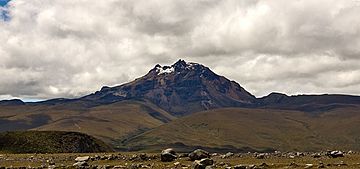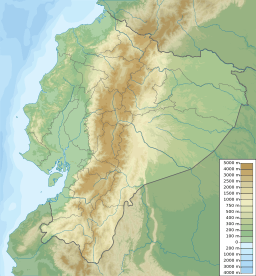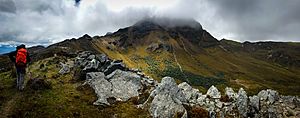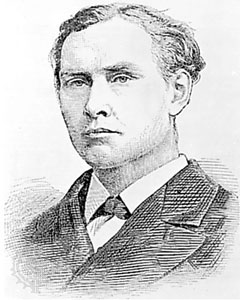Sincholagua Volcano facts for kids
Quick facts for kids Sincholagua Volcano |
|
|---|---|

Sincholagua Volcano
|
|
| Highest point | |
| Elevation | 4,899 m (16,073 ft) |
| Geography | |
| Parent range | Andes |
| Geology | |
| Mountain type | Stratovolcano, Historical |
| Last eruption | 1877 |
| Climbing | |
| First ascent | 23 February 1880 by Edward Whymper, Jean-Antoine Carrel and Louis Carrel |
| Easiest route | Scramble |
Sincholagua is a volcano in Ecuador. It is no longer active, meaning it won't erupt again. This mountain is about 17 kilometers (11 miles) northeast of Cotopaxi Volcano. It is also about 45 kilometers (28 miles) southeast of Quito, the capital city.
Sincholagua is the 12th highest peak in Ecuador. It stands at 4,899 meters (16,073 feet) tall. The name "Sincholagua" comes from the Quichua language. It means "strong above." Even though it's very tall, it's not as famous as some other mountains nearby. This is because it's close to Cotopaxi, which is a very popular volcano. Sincholagua used to have glaciers all year round. These were large sheets of ice. But the glaciers melted many years ago. Still, you can often see snow on its peak. This happens when there is heavy snowfall at the top.
Climbing Sincholagua
Sincholagua is one of the less climbed mountains in Ecuador. It can be hard to reach. Also, it is not as well known as other volcanoes like Pichincha or Cotopaxi. Getting to Sincholagua involves a long hike. This makes it more challenging to access.
People who climb Sincholagua enjoy amazing views. You can see other mountains like Cotopaxi and Antisana. You can also see the Western Cordillera mountain range. Plus, you get a glimpse of the Amazon rainforest.
The climb itself is not too hard. It usually takes about three and a half hours. This is from the base camp to the top. This time is for good weather conditions. The normal way to climb is along the Northwest ridge. This was the path used by the first climbers. Most people start their climb from the south. They go through Cotopaxi National Park to reach the volcano. You can also get to Sincholagua from Quito.
History of Sincholagua
The first people to climb Sincholagua were Edward Whymper, Jean-Antoine Carrel, and Louis Carrel. They reached the top on February 23, 1880. Edward Whymper is famous for being the first to climb the Matterhorn mountain in Switzerland.
Many decades ago, Sincholagua lost all its permanent glaciers. Before that, it had a glacier about 1.5 kilometers (almost a mile) long. There is a river called the Río Pita that flows around the mountain. This river became much wider after the last big eruption in 1877. When Whymper climbed Sincholagua, the Río Pita was about 60 meters (200 feet) wide and 1 meter (3 feet) deep. After the eruption, in 1892, it grew to 335 meters (1,100 feet) wide and 15 meters (50 feet) deep in its widest and deepest parts. Today, it is considered a small stream.
Plane Crash on Sincholagua
On May 3, 1995, a private plane crashed into Sincholagua. It was a Gulfstream II aircraft. The plane was flying at night. It was trying to land at Quito's Mariscal Sucre Airport. But the pilots chose the wrong radio frequency. This made the plane fly about 19 kilometers (12 miles) too far south. It hit Sincholagua at about 4,877 meters (16,000 feet) high.
All seven people on board died in the crash. The flight was carrying important business leaders. They were from Argentina and Chile. They were going to a meeting in Quito. Among those who died were the CEO of an Argentine oil company and the general manager of a Chilean oil company.
See also
 In Spanish: Volcán Sincholagua para niños
In Spanish: Volcán Sincholagua para niños
 | Aurelia Browder |
 | Nannie Helen Burroughs |
 | Michelle Alexander |




